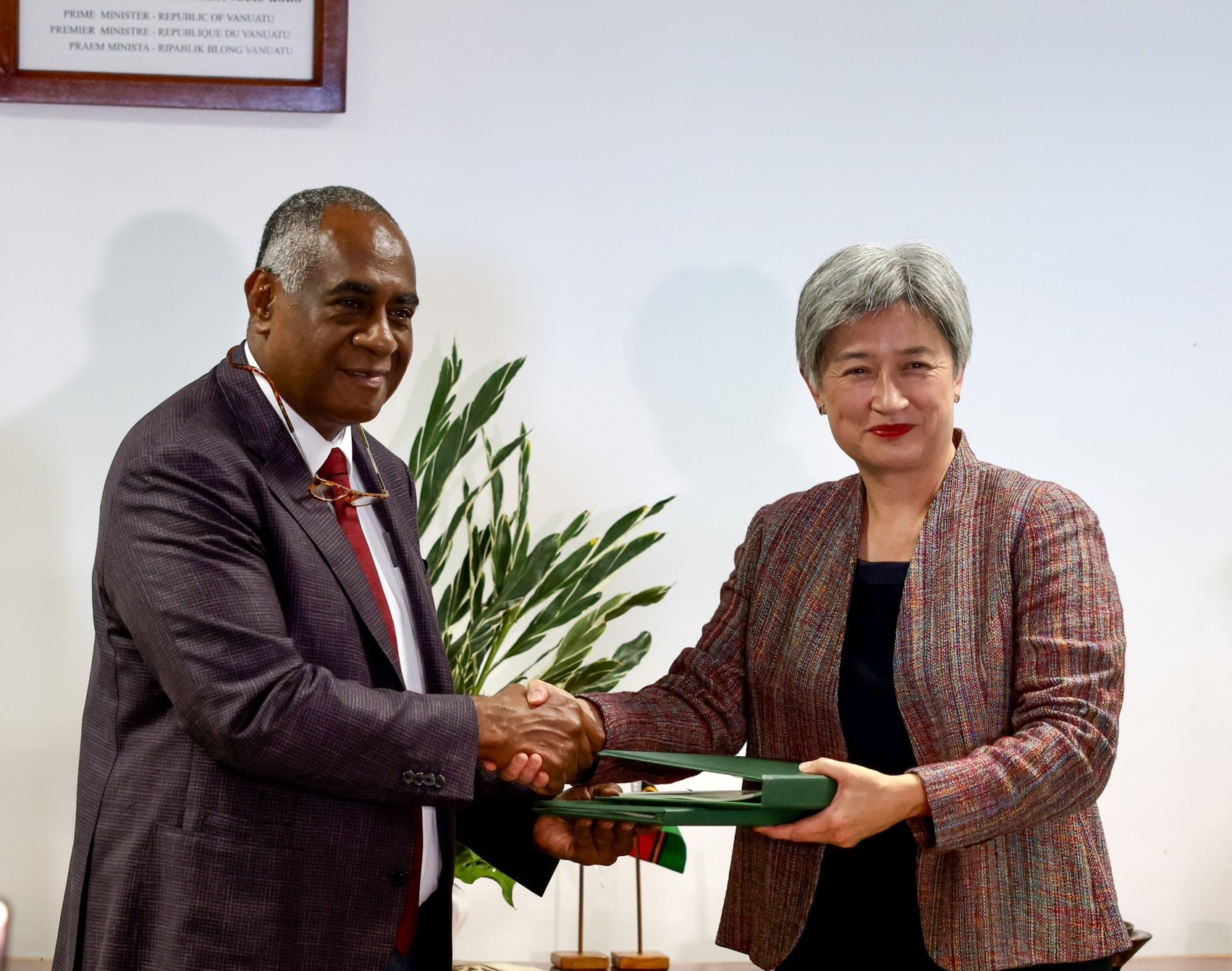Anxieties are growing in Canberra that a landmark security agreement between Australia and Vanuatu could stall in the Pacific nation’s parliament, with Prime Minister Ishmael Kalsakau facing increasing political blowback after signing the pact last year.
Foreign Minister Penny Wong surprised many observers and foreign diplomats when she and Kalsakau inked the security pact during a bipartisan visit to Vanuatu in December.
The agreement would cement Australia’s security ties with Vanuatu, streamlining the deployment of Australian military personnel responding to natural disasters in the country, as well as formalising regular defence talks and deepening cooperation on border security, cyber attacks, biosecurity and aviation.
Analysts called it a significant strategic victory for Australia, which has been working to buttress its position as the region’s military “partner of choice” and block China from signing more agreements like its contentious security pact with Solomon Islands.
But the document still must be ratified by parliaments in both countries before it can enter into force.
And there are growing signs that Kalsakau may face a political battle to get Vanuatu’s parliament to sign off on the pact, with opposition MPs – and even some senior ministers — pushing to delay, amend, or even scrap it.
In February opposition MPs in Vanuatu bristled when the Australian government flew Kalsakau and other ministers to Canberra on a military transport plane for formal meetings with the Albanese government, suggesting the prime minister had drawn too close to Australia.
“The opposition is concerned that any government of the Republic of Vanuatu must conduct its relations impartially and that it does not allow Vanuatu to be sucked into a game it does not want and be used inappropriately by competing nations to exert dominance in the region,” they said.
“Vanuatu as a sovereign Pacific nation cannot afford to play this kind of game with conflicting military rivals.”
Some Australian officials are also worried that there is internal division over the security pact in the upper echelons of Vanuatu’s government.
One federal government source told the ABC that Vanuatu Foreign Minister Jotham Napat had been delaying the ratification process, although they declined to say why.
The source said Australia’s High Commissioner to Vanuatu, Heidi Bootle, had “hit a brick wall” when advocating on the issue.
The ABC asked Napat and his office for comment, but they did not respond. The ABC also tried to reach Kalsakau, but he did not return the ABC’s calls.
Tess Newton Cain, from the Griffith Asia Institute’s Pacific Hub, said there was little chance the pact would be ratified by Vanuatu “in the near term”.
“Senior members of the government – including but not limited to the foreign minister – are somewhat unhappy that the prime minister made a captain’s call on this, that it wasn’t approved by the Council of Ministers,” she said.
Dr Newton Cain said Napat was leading a broader review of Vanuatu’s foreign policy, which could also delay ratification.
“I think we’re likely to see a fair amount of stalling. The wheels of the ratification will turn very slowly,” she said.
Australian officials had been discussing a security agreement with Vanuatu since around 2018 without ever getting it over the line.
But Kalsakau offered to sign the pact within weeks of winning power in November – surprising even some in Canberra.
Dr Tess Newton Cain said she understood why Australia wanted to move quickly, but the political fallout showed that political support for the pact might be thin in Vanuatu.
“It does expose the risks of … zeroing in one on the bit of the architecture that seems receptive rather than thinking about building a consensus across the board,” she said.
The risks are also amplified by Vanuatu’s volatile national politics, where prime ministers regularly face votes of no confidence.
“There are always rumours of a motion of no confidence brewing. I’m sure Kalsakau will face at least one motion of no confidence,” Dr Newton Cain said.
“I don’t see this [treaty] as being enough to spark a motion, but if one is put forward it could be something that could be referred to as one of the reasons.2
“And it leaves everyone hanging now … it hasn’t been ratified by the parliament and as things currently stand there is nothing to indicate it will be brought to ratification in the near future.”
The agreement is also yet to be ratified by Australia’s parliament, but both Labor and the Coalition expect it will sail smoothly through the committee process before being approved later this year.
When Kalsakau visited Australia in February Prime Minister Anthony Albanese told Parliament he “look[ed] forward to bipartisan support” for the pact.
Shadow Foreign Minister Simon Birmingham said the security pact was “an important agreement that will further regional cooperation, which was initiated by the Turnbull government.”
“It is crucial the Albanese government do everything possible to ensure its ratification by both nations, and not let this opportunity slip through its fingers,” he said.
A spokesperson for the Department of Foreign Affairs and Trade said that both prime ministers “discussed the Bilateral Security Agreement and noted progress towards its ratification during PM Kalsakau’s February visit to Canberra”.
“The ratification process in the Australian Parliament will commence as the parliamentary schedule allows,” they said.
“Questions on the ratification process through the Vanuatu Parliament is a matter for the Government of Vanuatu”.
SOURCE: ABC/PACNEWS














